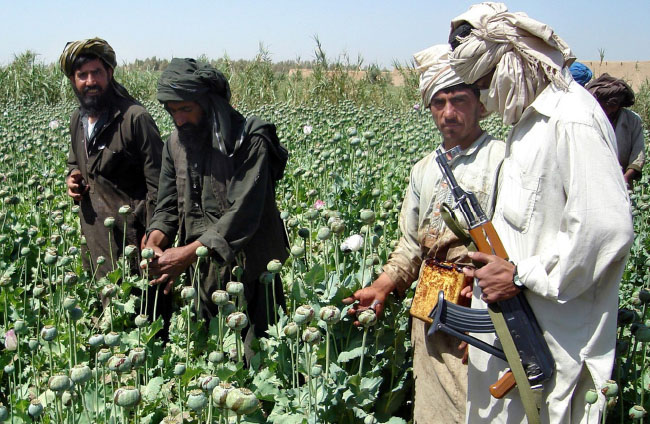The product of narcotic drug is one of the great challenges in Afghanistan and has supported the war. This is also an international issue and devastated a large layer of human society. Its harm to mankind needs the attention of international community. Based on census, there are three million addicted individuals, including one million women, in Afghanistan. Despite this fact, combating the cultivation and smuggling of drug is not included in international agenda regarding Afghanistan. In the “Region Counter Narcotics Senior Experts’ Conference” held on Monday in Kabul, Afghan counter-narcotic minister said that the sporadic and single struggles of state would not be a remedy for this problem. The states had to prioritize a common strategy for combating drug. Brig. Gen. Abdul Khalil Bakhtyar, deputy minister of counter-narcotics, said regional countries should increase their cooperation in terms of fighting drugs. He said cultivation, smuggling and use of drugs were major challenge to stability and peace in Afghanistan.
In an interview with BBC, Afghan President Muhammad Ashraf Ghani came with the question that although the Taliban are the greatest producer of narcotic drug around the globe, why the world does not pay heed to this issue? Since the cultivation of drug is the mainstay in Taliban’s militancy and it also destroys the lives of many people in human society, this question is very significant.
The cultivation of drug resulted in streams of blood and horrific destruction around the universe causing millions of people to suffer forever. Every day, it targets the human sentiments and inflicts excruciating pain on mankind. Its bitter drops put groups of people in the quagmire of addiction and leave them without honor and identity. The world of one’s happiness and cheer erodes and people succumb to death behind the advantageous business of narcotic drug.
The Taliban, along with many terrorist groups, trigger terror and resort to killing and destruction being backed by narcotic drug. Although the Taliban banned the cultivation of narcotic drug during the last years of their regime, the United Nations announced, in the meantime, that there were stocks of drug in the Taliban-dominated areas. It added that the reason behind forbidding the cultivation of drug was to increase its rate in international market. Drug is still one of the great supporters of the Taliban’s war. Drug is cultivated in the Taliban-dominated areas and the borders to neighboring countries are also under their control for trafficking it. There is an unnoticeable relation between the Taliban and drug traffickers. The Taliban receive ransom from smugglers and support them in return. The smugglers also seek Taliban’s control in drug trafficking routes.
Meanwhile, this issue is still not included in the agenda of the countries which are combating terrorism and seeking peace in Afghanistan. It is crystal clear that the most effective way for combating terrorism is rooting out their financial support which has high achievements with low cost. The question is that why there has been no serious campaign against it? The location of drug manufacturers – which operate without dilemma – seem to be clear in Afghanistan’s soil. Similarly, drug trafficking routes are obvious and national and international forces are believed to have easy access to drug traffickers but still no serious step has been taken in this respect. Therefore, Afghanistan’s presidential palace asks that why the world does not pay attention to the issue of narcotic drug?
With the silence of international community, the phenomenon of cultivation of drug in the Senior Officials’ Meeting (SOM) – held in Kabul in 5 October – was not taken into account as it should have been. This silence puts the macro strategies for combating terrorism under question. How the strategies of fighting terrorism will come to fruition without eradicating their financial resources? Why the significant negotiations for bringing peace do not consider the main source of war and violence? Why the safe places for drug production are not attacked? These are the questions to be answered by the international community. Hence, the international community will have to include the campaign against drug dealing in its agenda and pave the ground, in harmony with Afghan government, for the eradication of drug manufacturers, cultivating drug, and the heads of drug traffickers. It is imperative that international forces stationed in Afghanistan target drug traffickers and deal with drug trafficking seriously and legitimately. Having the main burden of combating terrorism, the international community should disclose the names of individuals and governments that support drug trafficking networks. In another item, citizens should know drug trafficking monsters and the trafficking routes need to be struck to put an end to the funding source of terrorism. Otherwise, the national and international struggles made in bringing peace will not bear the desired result.
Home » Opinion » Why the World Turns a Blind Eye to Narcotic Drug?
Why the World Turns a Blind Eye to Narcotic Drug?
| Muhammad Ishaq Arifi

